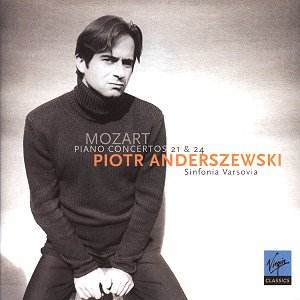Mozart's most important orchestral music of his years
in Vienna came in the form of piano concertos, which allowed him to
make contact with his public in the dual role of performer and composer.
In a sense the recent trend of pianist-directors has encouraged the
notion of the visionary artist parading his talents in a more intense
way than might otherwise be possible.
Such thoughts come naturally to mind on hearing these
highly characterful performances, in which Piotr Anderszewski and the
Sinfonia Varsovia project a stronger personality of their own than is
often found in recent performances. This can sometimes mean that dangerous
risks are taken, and there is no question that this pianist has very
much his own way with the music. But no matter, since great music is
always greater than any one performance of it, and in any case engagement
with a fine interpretation will always, at the time at any rate, give
the listener the impression that the music could not possibly be otherwise.
The C minor Concerto, K491, is placed first on the
programme and is the most uniquely characterful of the two performances,
in the sense outlined above. The opening orchestral tutti is beautifully
played and scrupulously phrased, and the point is reinforced by the
solo entry, for which Anderszewski takes a subtly slow tempo, thereby
making a special impression. This is the largest orchestra Mozart ever
used in a concerto, with full double woodwind, horns, trumpets and drums,
in addition to the usual strings. But for much of the time the minor
key atmosphere of the music is hushed rather than outgoing, so that
when climaxes are reached the impact is all the greater.
The slow movement has a beautifully judged line, while
the variation finale (perhaps Mozart's greatest concerto finale) has
both unity and variety. This is a really interesting interpretation,
and if it seems romanticised then it takes its cue from the nature of
the music itself.
The C major Concerto, K467 is also very interesting
in this performance, its fundamental character apparent from another
finely judged opening tutti. In both works Anderszewski plays his own
cadenzas, and he does so with characteristic abandon and emotional freedom.
There is no attempt at quasi-authentic restraint, but rather an exploration
of the expressive and technical potential of the music as he feels it.
As a listening experience it is nothing if not striking, but the question
remains 'how often would one want to hear it?' That comes down to the
nature of record collecting, of course. If one's collection is small
and listening rotates around a few much loved discs, then better to
hear a sensitively played, more conventionally 'Mozartean' performance,
like those of Murray Perahia or Clifford Curzon, but if you want to
explore the potential of this wonderful music and hear more and more
in it with each engagement, then this is well worth hearing and owning.
The recorded sound is quite splendid, enhancing the
subtleties of the piano-orchestra relationship, which is the ultimate
test in this repertoire.
Terry Barfoot


